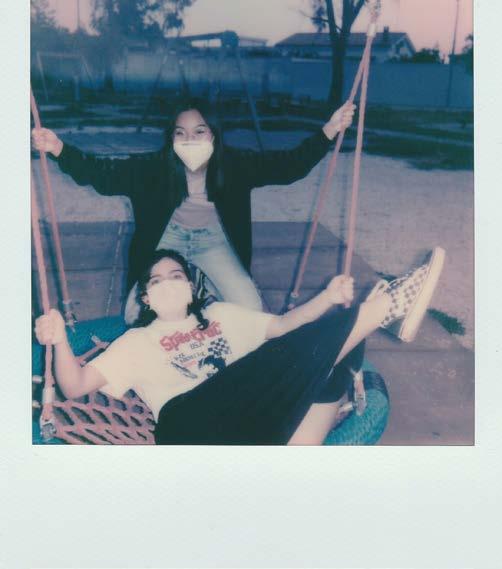
4 minute read
SPOTLIGHT ON INCLUSIVITY: COVID BUSINESS SPECIAL NEEDS
by Yvonne Wright

JACK’S & STEAMERS
“When the pandemic hit, that just turned everybody’s world upside down.” Luke Davidson is one of the millions of employees impacted by COVID-19. While the epidemic is hard on everyone, it’s been especially hard for Colorado workers with special needs. Davidson is employed by one of two local businesses that hire employees with developmental disabilities. Like other small, locally owned businesses, they’re struggling this holiday season to stay afloat. Many aren’t even looking for a profit. They just want to break even so they can keep their doors open until the pandemic ends. For many with special needs, this is the first opportunity they’ve had to work and make money. For most, it’s more than a paycheck. It’s where they go to meet friends and feel good about their contributions. “I’m more than thankful. I’m excited to work,” he says. Davidson has worked at Jack’s & Steamers for 10 years. The Arvada bar and grill employs dozens of special needs employees. Davidson used to work making the gourmet jams and jellies they sell online. The restrictions brought him into the kitchen where he now works washing dishes. “We are like a family. All of us,” he says. When I ask him about his supervisor, his response is not one you would hear in most companies. While he acknowledges his bosses can be frustrating, the depth of his feelings for them is so strong he needed to take a break. “I get emotional,” he says while choking back tears. “We have arguments; we have debates, but Garrett has that passion about his work. How he cares about people makes me want to work more.” Davidson is talking about Garrett McGovern, a manager there for the last 10 years. McGovern describes the business as a brain trust. When the closures were first put in place in April, McGovern says everyone gathered that night. “We formed our plan of attack, and were re-open within a day with delivery and a take-out menu for breakfast, lunch, and dinner.” It wasn’t easy. After a lot of trial and error, they figured out how to streamline online and phone-in orders so food would be hot and ready when customers came to pick it up. “We had 500 dinners out of the blue [the first night] … at 6:00, I had 75 orders all at once; the cooks knew they had 15 minutes to get the orders out, and there was just no way.” McGovern says it took about a month to get all the kinks worked out, and he said the latest round of shutdowns are going great.
SUSTAINABILITY RECYCLING

Adapting to catastrophic change is something Sustainability Recycling also had to do. After a bumpy start, the metro area’s only company to offer hard-to-recycle centers is up and running after a three-month closure.
Co-owner Melisa Kraai says they employ special-needs people who often have high-risk medical conditions, so they needed to make sure their five recycling centers in Denver and Arvada were as safe as possible before reopening. “We’ve spent upwards of $15,000 on safety, including plexiglass at each workstation, air purifiers at all sites, heaters, and tons of PPE … We have 20 pages of safety protocol and procedure that was put together,” she said. Kraai credits emergency, federal loans for small businesses with keeping Sustainability afloat. And she said the epidemic has had an unexpected positive impact on the company as well. “When all the cards were thrown up in the air due to COVID … it gave us the opportunity to make changes in a few months that would have taken us years to put in place. We’re a different business. We’ve positioned ourselves to be more financially sustainable in the long-run,” she says. Some of those changes include a residential composting pick-up service, exploring partnerships with new cities, and offering more individualized services to people with developmental delays. Monica Garcia has worked there four of the 11 years they’ve been open. She says the supervisors really came through when she was laid off and needed them the most. “The staff picked me up at my house, and we would go for walks. It helped me with my exercise, my social skills, and in getting out of the house a little bit to make me happy.” Kraai says those staff members are the ones she worries about the most. “Our job coaches are front-line workers and work in a field that does not have enough funding to pay people well … If we must move to furlough or layoffs, they will not make enough in unemployment to pay their rent or mortgages and meet their and their family’s basic needs.” This is a situation thousands of Coloradans face, as the virus spreads and closures continue. Sustainability is considered an essential business, so their doors remain open. Jack’s & Steamers serves food on it’s patio, takes take-out orders, and sells the homemade jams and jellies special needs people make online. These businesses hope to keep their doors open and continue to employ people who might not otherwise have a job. McGovern says going out of business in simply not an option. “We have too many people counting on us, we have to keep it going."

Highlands Constellation Program

Call Us Today 720-348-2800
At Highlands Behavioral Health, we are committed to creating and preserving a culture and environment of respect and inclusion. Constellation is the manifestation of our vision of inclusive care. It is a queer-inclusive program designed to meet people where they are and deliver care that is tailored to who they are.









